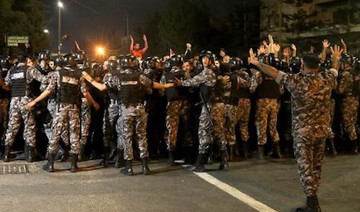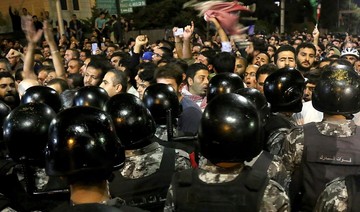AMMAN: Attempts by Jordan’s government to quell mounting unrest by backtracking on planned fuel price rises appear to have failed with widespread street protests lasting until the early hours of Saturday morning.
As protesters warned that nightly demonstrations would continue, political analysts said the issue had become larger than the fuel price hikes and a draft income tax law, and was now centered on general disillusionment with the government’s economic policies.
Late-night protests were described as “an explosion waiting to happen” and “the beginning of Jordan’s Arab spring II” by political observers.
A meeting on Friday night between the speaker of the lower house of Parliament, Atef Tarawneh, Prime Minister Hani Mulqi, and members of the professional unions failed to produce a breakthrough on the tax issue.
Musa Maaytah, Jordan’s minister of political and parliamentary affairs, told Arab News that more than 80 members of Parliament had signed a petition saying they would vote against the income tax law.
“This is only one of many ideas that we will discuss, but the exact date of an extraordinary session of the Parliament is the king’s prerogative.”
In a press conference after the meeting, Mulqi said: “We are going to continue talking until we reach agreements. We understand each other better.
“We spoke to unions about the economic situation in Jordan and told them we have completed 70 percent of the economic plan agreed to with the International Monetary Fund and that to complete it Jordan has to approve a modern tax law that protects the lower and middle class.”
Ali Abbous, head of the Jordanian Professional Unions Association, said that no agreement had been reached on the income tax law.
Jawad Dweidar, a member of the Hirak Shabibi (youth movement), told Arab News that nightly protests will continue until there is a shift in government direction.
“What we want is a clear change in policy, not a change of persons here and there,” Dweidar said.
Government policies were forcing people to protest: “If the government retracts the moves, the streets will quieten.”
Dweidar said that he will not be directly affected by the draft income tax law but feared those affected would pass on the increase to consumers and poorer people.
“This income tax law will affect all of us,” he said.
A video of the protests showed demonstrators early on Saturday shaking hands with police and asking their forgiveness for forcing them to work late.
Musa Shteiwi, director of the strategic studies center at Jordan University, told Arab News that people want a “responsive and transparent government that can include the public in all its discussions.”
The political analyst said the protests were more than “a storm in a tea cup.”
“This could be an Arab Spring II for Jordan,” he said. “After the first Arab spring we saw some political movements, but many of these accomplishments have been rolled back and the public hasn’t seen any economic improvement, while the political class has thrived at the expense of the poor.”
Studies have shown that trust in the government has plummeted in the past two years and was now at an all-time low.
Head of the left-wing Hashd party, Abla Abu Elba, said the protests were “an explosion waiting to happen.”
“The flames of the fire have reached both lower and upper classes of society. We have asked for debates and discussions with the government, but have been rebuffed. People simply can’t take what is happening,” she said.
Tarek Khoury, an opposition member of Parliament, expressed doubts about Parliament rejecting the income tax law.
“I prefer that the government withdraws this law because I can’t count on the conscience of some in regards to upholding the desires of our great people,” he wrote on Twitter.
Jordan’s growing protests ‘an explosion waiting to happen’
Jordan’s growing protests ‘an explosion waiting to happen’

- Studies have shown that trust in the government has plummeted in the past two years and was now at an all-time low
- The flames of the fire have reached both lower and upper classes of society













